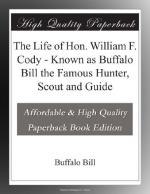General Carr having obtained a leave of absence, Colonel Royal was given the command of an expedition that was ordered to go out after the Indians, and in a few days—after having rested a couple of weeks—we set out for the Republican; having learned that there were plenty of Indians in that section of the country. At Frenchman’s Fork we discovered an Indian village, but did not surprise it, for its people had noticed us approaching, and were retreating when we reached their camping-place. We chased them down the stream, and they finally turned to the left, went north, and crossed the South Platte river five miles above Ogallala. We pushed rapidly after them, following them across the North Platte and on through the sand-hills towards the Niobrara; but as they were making much better time than we, the pursuit was abandoned.
While we were in the sand-hills, scouting the Niobrara country, the Pawnee Indians brought into camp, one night, some very large bones, one of which a surgeon of the expedition pronounced to be the thigh-bone of a human being. The Indians claimed that the bones they had found were those of a person belonging to a race of people who a long time ago lived in this country. That there was once a race of men on the earth whose size was about three times that of an ordinary man, and they were so swift and powerful that they could run along-side of a buffalo, and taking the animal in one arm could tear off a leg and eat the meat as they walked. These giants denied the existence of a Great Spirit, and when they heard the thunder or saw the lightning they laughed at it and said that they were greater than either. This so displeased the Great Spirit that he caused a great rain-storm to come, and the water kept rising higher and higher so that it drove those proud and conceited giants from the low grounds to the hills, and thence to the mountains, but at last even the mountain tops were submerged, and then those mammoth men were all drowned. After the flood had subsided, the Great Spirit came to the conclusion that he had made man too large and powerful, and that he would therefore correct the mistake by creating a race of men of smaller size and less strength. This is the reason, say the Indians, that modern men are small and not like the giants of old, and they claim that this story is a matter of Indian history, which has been handed down among them from time immemorial.
As we had no wagons with us at the time this large and heavy bone was found, we were obliged to leave it.
CHAPTER XXIII.
ADMINISTERING JUSTICE.
On returning to Fort McPherson we found that Brevet Major General W.H. Emory, Colonel of the Fifth Cavalry, and Brevet Brigadier General Thomas Duncan, Lieutenant Colonel of the regiment, had arrived there during our absence. General Emory had been appointed to the command of the District of the Republican, with headquarters at Fort McPherson. As the command had been continually in the field, it was generally thought that we were to have a long rest; and it looked as if this post was to be my home and headquarters for some time to come. I accordingly sent to St. Louis for my wife and daughter to join me there. General Emory promised to build a house for me, but before the building was completed my family arrived.




